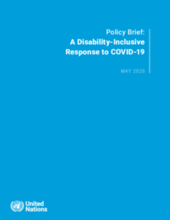This Policy Brief by the United Nations highlights the impact of COVID-19 on persons with disabilities and in doing so, outlines key actions and recommendations to make the response and recovery inclusive of persons with disabilities.
While the brief contains specific recommendations focusing on key sectors, it identifies four overarching areas of action that are applicable for all.
1. Ensure mainstreaming of disability in all COVID-19 response and recovery together with targeted actions. A combination of mainstream and disability-specific measures are necessary to ensure systematic inclusion of persons with disabilities.
2. Ensure accessibility of information, facilities, services and programmes in the COVID-19 response and recovery. Accessibility is fundamental to the inclusion of persons with disabilities in the immediate health and socio-economic response to COVID-19. If public health information, the built environment, communications and technologies, and goods and services are not accessible, people with disabilities cannot take necessary decisions, live independently and isolate or quarantine safely, or access health and public services on an equal basis with others.
3. Ensure meaningful consultation with and active participation of persons with disabilities and their representative organizations in all stages of the COVID-19 response and recovery. Persons with disabilities have important contributions to make in tackling the crisis and building the future. Many persons with disabilities have experience of thriving in situations of isolation and alternate working arrangements that can offer models for navigating the current situation. Perspectives and lived experiences of disability contribute to creativity, new approaches and innovative solutions to challenges.
4. Establish accountability mechanisms to ensure disability inclusion in the COVID-19 response. Ensure inclusive investments to support disability-inclusive outcomes. Governments, donors, UN agencies and other actors need to establish mechanisms to monitor investments to ensure it is reaching persons with disabilities. Disaggregating data by disability is key to ensure accountability. Inclusion of persons with disabilities in the COVID-19 response and recovery is a vital part of achieving the pledge to leave no one behind, and a critical test of the global commitments of the Convention of the Rights of Persons with Disabilities (CRPD), the 2030 Agenda for Sustainable Development, the Agenda for Humanity and the United Nations Disability Inclusion Strategy. It is also central to the UN’s commitment to achieve transformative and lasting change on disability inclusion.
The brief outlines key actions to protect persons with disabilities from contracting COVID-19 and the impact of lockdowns, physical distancing and isolation measures, and to achieve a disability-inclusive response and recovery. It highlights in particular the importance of protection people in institutional settings, including children, in this context, recommending to:
Reduce the number of people within institutions. It is important to take immediate action to discharge and release persons with disabilities from institutions, whenever possible. Deinstitutionalization strategies need to be accelerated and reinforced with clear timelines and concrete benchmarks.

